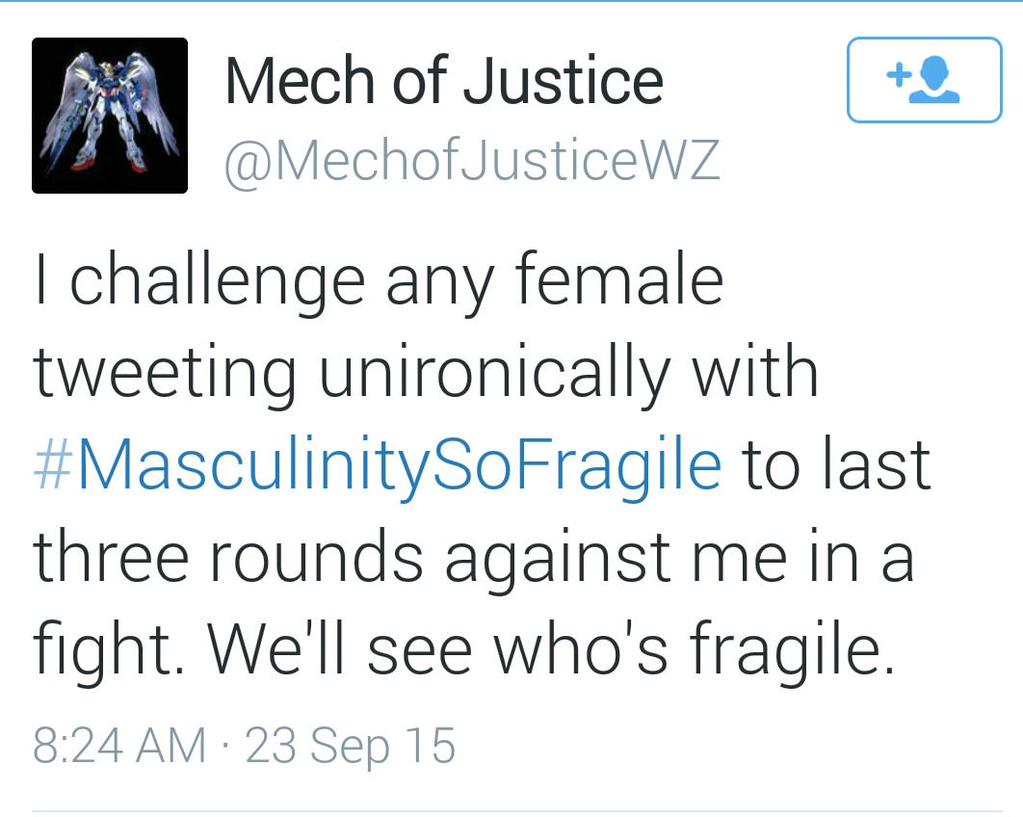#MasculinitySoFragile it’s not therapy, it’s ManTherapy. With MEAT and FIGHTER JETS pic.twitter.com/oAXiYw4BIT
— stefapie (@stefapie) September 23, 2015
The #MasculinitySoFragile hashtag is currently trending on Twitter. It’s a hashtag that seems to have been created to highlight the downsides and pitfalls of toxic masculinity. We live in a world that puts men down for expressing emotions and feelings that are considered “feminine,” and toxic masculinity is partially to blame for that.
Perhaps one of the most egregious effects of the fragility of masculinity is in how when men’s advances are rejected, it’s almost expected of them to react violently. There’s this requirement to lash out verbally or even physically at whoever’s rejected them. There’s always this need to “prove you’re a man” by responding to perceived threats–even if those threats never existed in the first place.
#MasculinitySoFragile that some men feel that to prove themselves as a “real man” they have to be disrespectful to women and demean them
— ˗ˏˋ blige ˎˊ˗ (@THECAROLDANVERS) September 23, 2015
Case in point: once the #MasculinitySoFragile hashtag began to trend, men took it as a personal attack on them. They responded with threats of violence, and directed insults at those posting to the hashtag. One even went so far as to literally threaten to fight anyone who RTs them.
See the screencapped tweet below:
Let’s do this, Twitterers! RT if you want to see me fight @MechofJusticeWZ per his request #MasculinitySoFragile pic.twitter.com/uBihFlcA3P
— Pia Glenn (@PiaGlenn) September 23, 2015
#MasculinitySoFragile You respond to a hashtag about emotional fragility by challenging women to hand to hand combat
— *Lana Del Rey voice* (@applecidermage) September 23, 2015
If that doesn’t prove how fragile masculinity is, then I’m not sure what does. Check out some of these other tweets in the hashtag.
#MasculinitySoFragile the color pink is now a “gay” color pic.twitter.com/byWi7E9aoZ
— #1 kimberlysus hater (@apunkfemme) September 23, 2015
#MasculinitySoFragile men can’t do anything unless we bless it with a “man” word. Manbun, guyliner, man-bag…
— Ginny McQueen (@GinnyMcQueen) September 23, 2015
#MasculinitySoFragile that a very intelligent, secure, confident woman who provides for herself is seen as “intimidating” & a threat.
— meek’s inside voice (@delafro_) September 23, 2015
#masculinitysofragile that dudes have to harass anyone pointing it out.
— Randi Lee Harper (@randileeharper) September 23, 2015
men: *don’t interact with gay men as afraid of sexual harassment* also men: *sexually harass women* #MasculinitySoFragile
— ˗ˏˋ blige ˎˊ˗ (@THECAROLDANVERS) September 23, 2015
#MasculinitySoFragile they will bombard this hashtag, attack women strangers & prove its point.
— Tauriq Moosa (@tauriqmoosa) September 23, 2015
#MasculinitySoFragile Guys have to say “no homo” when showing affection to another guy, which is like saying “no Oedipus” when u hug ur mom.
— Brandon Evers (@BrandonEvrs) September 23, 2015
#MasculinitySoFragile that your entire sense of self is compromised by the new female Ghostbusters.
— Laurie Penny (@PennyRed) September 23, 2015
#MasculinitySoFragile it can be undone with a handbag pic.twitter.com/HND8YGu4Iq
— Sarah Misandrist (@sazza_jay) September 23, 2015
#MasculinitySoFragile men haven’t learned how to separate criticism of masculinity as a construct from criticism of them as individual men
— Bailey (@the_author_) September 23, 2015
Perhaps most tragic is how toxic masculinity intersects with LGBT identities. As you saw above, there’s quite a few examples of how “gay” can be seen as an insult, as a suggestion that something or someone is “less than” because they’re identifying as or accused of being gay.
In fact, trans people often end up paying an incredible price because of toxic masculinity, most losing their lives because of this insistence that the only reaction to finding out someone is trans is violence.
#masculinitysofragile that men are killing trans women they find attractive because they fear their heterosexuality has been threatened
— BlackMajiik (@SappRHOofLesbos) September 23, 2015
#MasculinitySoFragile they go running back to cis women.
— Morgan M Page (@morganmpage) September 23, 2015
So far this year, a reported 18 Black trans women have been murdered in America. #MasculinitySoFragile
— zellie (@zellieimani) September 23, 2015
#MasculinitySoFragile isn’t a personal attack on men. It’s an attack on how society wants to view men. But judging by the responses to many of these tweets, that point seems to have gone entirely missed. Proven, perhaps, but lost on those who might need to hear it most.
—Please make note of The Mary Sue’s general comment policy.—
Do you follow The Mary Sue on Twitter, Facebook, Tumblr, Pinterest, & Google +?









Published: Sep 23, 2015 11:48 am